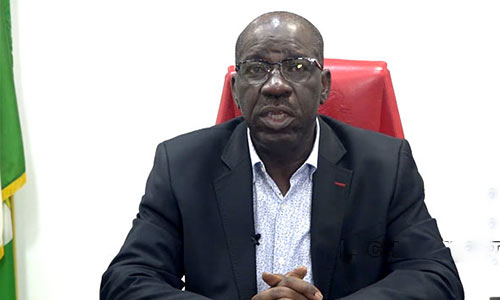
Hon. Justice Ahmed Mohammed of the Abuja Division of the Federal High Court yesterday directed the Edo State Governor, Godwin Obaseki, to present a Certified True Copy (CTC) of his appeal against the ruling of the court which declined to strike out his application against some paragraphs of the plaintiffs’ reply to his statement.
Justice Mohammed gave the order in a short ruling in an application seeking to stay proceedings in the suit pending the determination of Obaseki’s appeal at the Court of Appeal in Abuja.
The All Progressives Congress (APC) had dragged Obaseki to court, accusing him of allegedly forging his Bachelor of Arts degree certificate as well as lying on oath in his form CF 001 submitted to the Independent National Electoral Commission (INEC) to aid his qualification for the 2020 governorship election in Edo State.
The court had late last month struck out Obaseki’s application argued by his lead counsel, Ken Mozia (SAN), that some paragraphs in the plaintiffs’ statement of reply be removed.
The court subsequently adjourned to December 9 (yesterday) for commencement of trial.
However, when the matter came up yesterday, Mozia informed the court that his client, not satisfied with the ruling, approached the Court of Appeal to set aside the lower court’s ruling.
According to him, copies of the record, receipts and acknowledgment letter from the appeal court to prove that there is indeed an appeal are before the court.
He, therefore, urged the lower court to stay proceedings, pending the hearing and determination of the appeal.
While responding, counsel to the plaintiffs, Chief Akin Olujimi (SAN), told the court that he was served with the notice of appeal, but noted that the appeal was “an unauthorised, incompetent record of appeal prepared by Ken Mozia.”
Olujimi added that the document did not bear record of appeal number apart from the one read out by the counsel.
The counsel also claimed that the number is not on the copy of the record which was served on him.
Olujimi submitted that the proper procedure of notifying a lower court of the pendency or a stay of proceedings is through compilation and entry of record of appeal and by an affidavit, setting out all the relevant facts, and not oral notification to the court by a counsel.
According to him, “There is nothing before the court that an appeal has been entered in the court of appeal. In the absence of proper notification, the only thing we can do now is for the counsel to argue stay of proceedings and we shall respond to it.”
Olujimi reminded the court that pre-election matters are sui generis that needed to be disposed within the statutory time.
As at today, the court is left with barely 30 days to adjudicate in the matter or else it becomes statute barred and a mere academic exercise.
However, Mozia, while opposing Olujimi, argued that once a counsel shows proof of pendency of a matter at the appeal court, the lower court is bond to adjourn indefinitely.
In his ruling, Justice Mohammed held that the court has a duty to find out whether the matter has been entered at the appellate court or not.
“The only justice, in my opinion, is to adjourn the matter to allow the first defendant to present proof that the matter has been entered at the court of appeal,” Mohammed ruled.
He subsequently adjourned till 12p.m. today.
The plaintiffs in the suit marked FHC/B/CS/74/2020 are alleging that Obaseki lied about his academic qualifications.
The plaintiffs accused the governor of allegedly forging the university certificate he presented to INEC in aid of his qualification for the governorship election that was held in Edo State on September 19, 2020.
